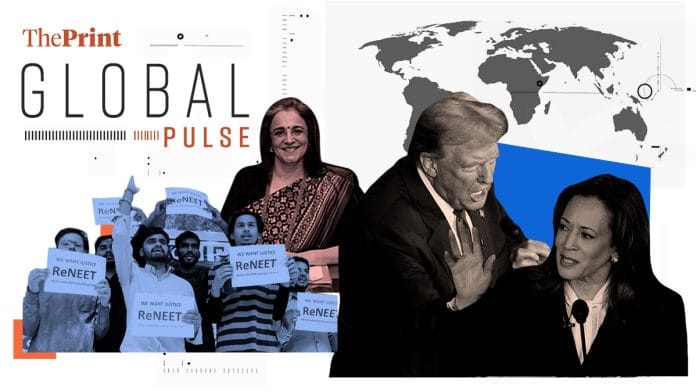New Delhi: Former United States president Donald Trump attacked US Vice President Kamala Harris during the 10 September presidential debate, insinuating an alleged shift in her racial identity, before he backtracked, saying he does not care about what she identified as. India never came up in the debate. And, disappointingly, Trump didn’t once refer to Harris by her name during the debate—in contrast to his habit of deliberately mispronouncing her first name, Kamala, at every given opportunity.
In July this year, Trump suggested that Harris misled voters in an address to the National Association of Black Journalists in Chicago. “I didn’t know she was Black until a number of years ago when she happened to turn Black, and now she wants to be known as Black. So, I don’t know, is she Indian or is she Black?” he had asked.
At the second presidential debate, the first between the two, broadcast live from Philadelphia on Tuesday, Trump toned down his rhetoric.
“All I can say is I read where she was not Black, and then I read that she was Black, and that’s OK,” he said. “Either one was OK with me. That’s up to her. That’s up to her.”
Harris didn’t take the opportunity to reaffirm her Indian heritage and instead said it was a “tragedy” that Trump was using “race to divide America”.
However, on 8 September, she posted photos of a childhood trip to India with her grandparents and implied her civil servant grandfather was a freedom fighter.
This week, The Wall Street Journal reported on how India is “facing an epidemic of cheating” in India’s college entrance and job recruitment exams in a piece — ‘Gangs are making millions helping Indians cheat on exams’.
Comprehensively summarising the various paper leaks and the National Eligibility-cum-Entrance Test (NEET) scam, the report points out that cheating rings charge exorbitant amounts and can earn millions of dollars from a few hundred students.
Unlike U.S. universities that combine essays, test scores and interviews to assess students, WSJ writes that Indian universities use competitive testing, which is why a high exam score is important.
“The exam scandals are turning into a major problem for India’s government. In Uttar Pradesh, where the ruling Bharatiya Janata Party held most of seats, the party came second to an opposition alliance during national elections this year. Several young voters attributed the shock result in part to anger over the police exam, whose results were declared invalid as the cheating allegations grew,” the WSJ reports.
It also carries a quote from the director general of Uttar Pradesh Police, Prashant Kumar assuring that the state has beefed up security protocols. “Even a bird couldn’t fly near the exam centres without permission,” he is quoted as saying.
On the other hand, Bloomberg waded into the ongoing controversy swirling around the Securities and Exchange Board of India (SEBI).
In the report, Andy Mukherjee writes that ignoring SEBI’s “credibility crisis” would not make the problem go away, and Madhabi Buch’s silence is only adding to the confusion. Buch is both the first woman chairperson of SEBI and the first to head it from the private sector.
Mukherjee makes the caveat that investments “weren’t really a problem for her predecessors”—all of whom have been men. “It will be a pity if the media glare on Buch prompts New Delhi to revert to reserving top regulatory jobs for retired or retiring civil servants,” he writes. The column underscores the importance of how Indian policymakers should have concrete systems to avoid similar situations of potential conflict. And Mukherjee couches this concern with political insight to round off the piece.
“By hurling allegations in dribs and drabs, lawmakers opposed to Prime Minister Narendra Modi might keep this issue alive until parliament reconvenes in late November or early December. Their goal is to paint a picture of institutional decay and rampant crony capitalism under Modi’s decade-long control on power; the current crisis is just a backdrop. Its resolution in a way that will restore the SEBI’s credibility will be a welcome change for the Indian markets. But I’m not holding my breath.”
The Washington Post, this week, carried an Associated Press copy on the indefinite curfew imposed in Manipur Tuesday. Echoing the front pages of Indian newspapers, the report carried details of how students were tear-gassed while marching towards the governor’s house and that the internet has been shut down in parts of the state.
“Students say they are frustrated with authorities for failing to resolve the 16-month-long conflict,” the Post concludes.
(Edited by Madhurita Goswami)
Also Read: Global media on the ‘Indian playbook of curbing press freedom’ & leveraging the demographic dividend






